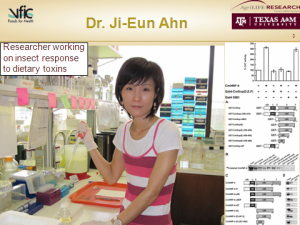My laboratory has been using modern tools in genomics, molecular biology and biochemistry to work in the plant-insect interaction arena. We have become interested in research showing that plant nutrients can be altered in response to environmental stimuli, including chemical treatments.
Certain polyphenolic compounds are known to have anticancer activities. Cyanidin-3-rutinoside, for instance, is a common anthocyanin found in certain fruits and vegetables in human diets. Cyanidin-3-rutinoside is reported to selectively kill leukemic cells by induction of oxidative stress. Recently, a preliminary greenhouse test has shown that a plant growth regulator-based product (from Stoller Enterprises, Houston TX) could increase production of cyanidin-3-rutinoside in black raspberries. Also, methyl jasmonate may enhance antioxidant activity. Thus, we have been planning to initiate testing the Stoller product on a fuller selection of fruits, to evaluate its effect on production of cyanidin-3-rutinoside and other phenolic and flavonoid compounds, including quantity and timing of production, during fruit development. Such research could be appealing to the nutraceutical industry, as well as promoting both yield and health-promoting properties of fruits for grower benefit. VFIC is an ideal place for such research because fruits and vegetables are the major crops we study, and promoting human health is a main goal of our research.
We have also been involved in research related to the drug-interference problem associated with consumption of grapefruits. We have used microarrays to identify insect P-450 genes that can degrade furanocoumarin, which will lead to the solution to this drug-interference problem and maintaining health-promoting properties of the grapefruit. We have made significant progress in regard to that aspect.
 |
 |
 |

